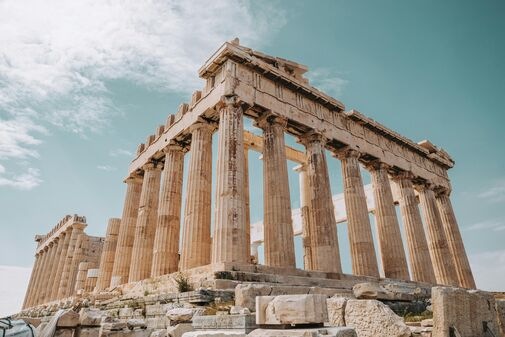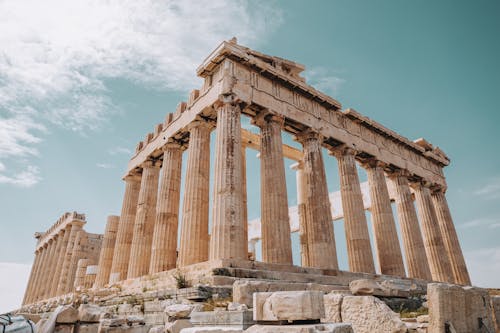


Explore Greece beyond guidebooks – from Athens to hidden islands and villages – while staying connected with an eSIM for Greece by Voye Global.
 When most people picture Greece, the first images that come to mind are often whitewashed houses with blue domes overlooking the Aegean, or the ancient ruins of Athens rising proudly above the city skyline. While these are iconic sights that every traveler should experience at least once, Greece has much more to offer for those willing to look beyond the obvious. With its rich history, diverse landscapes, and vibrant culture, Greece is a destination that rewards curiosity and invites travelers to explore far and wide.
When most people picture Greece, the first images that come to mind are often whitewashed houses with blue domes overlooking the Aegean, or the ancient ruins of Athens rising proudly above the city skyline. While these are iconic sights that every traveler should experience at least once, Greece has much more to offer for those willing to look beyond the obvious. With its rich history, diverse landscapes, and vibrant culture, Greece is a destination that rewards curiosity and invites travelers to explore far and wide.
No trip to Greece is complete without spending time in Athens. The Acropolis, crowned by the Parthenon, remains one of the most awe-inspiring sights in the world. Beyond this, the city has transformed in recent years, blending history with modern energy. Neighborhoods like Monastiraki and Plaka are perfect for wandering, offering bustling markets, artisan shops, and lively tavernas where music spills out into the streets.
What often surprises travelers is Athens’ thriving contemporary art and food scene. From rooftop bars with sweeping city views to avant-garde galleries, the capital has developed a dynamic identity that goes far beyond its ancient roots.
Greece’s islands are a world of their own. Santorini’s sunsets and Mykonos’ nightlife are legendary, but with more than 200 inhabited islands, travelers have countless options to explore.
Each island has its own character, traditions, and flavors, meaning island-hopping can feel like visiting multiple countries in one trip.
While the islands often take the spotlight, mainland Greece is equally captivating. The mountainous regions of Epirus and Thessaly offer dramatic landscapes, stone-built villages, and pristine hiking trails. One of the most remarkable sites is Meteora, where centuries-old monasteries perch atop towering rock formations, creating a view that feels almost otherworldly.
Further north, Thessaloniki combines Byzantine history with a youthful energy, fueled by its large student population and reputation as Greece’s culinary capital. Meanwhile, the Peloponnese peninsula is a treasure trove of archaeological sites, from the ancient theater of Epidaurus to the ruins of Mycenae, where legends of Homer’s epics come to life.
Greek cuisine is a cornerstone of the country’s culture, and exploring it is an adventure in itself. Each region has its specialties:
What ties Greek cuisine together is its focus on fresh, seasonal, and local ingredients. From olives and cheeses to honey and herbs, most meals are grounded in products that have been staples for centuries. Meals are rarely rushed, instead stretching into long conversations accompanied by wine, raki, or ouzo, reflecting the Greek philosophy that food is about community as much as nourishment.
Sweet lovers will find delight in traditional desserts such as loukoumades (honey-drenched dough puffs) or galaktoboureko (custard pie with syrup-soaked pastry). Coffee culture is another essential experience – sipping a strong Ellinikos (Greek coffee) in a shaded square is a daily ritual that connects locals and visitors alike.
Cooking classes and food tours have become popular among travelers seeking a deeper connection with Greek traditions. Learning to prepare dishes like moussaka, tzatziki, or spanakopita offers not just recipes, but stories about the land and families who’ve passed them down for generations. In this way, food in Greece becomes more than a meal – it’s a gateway into history, culture, and the Greek way of life.
Greece’s cultural calendar is rich and varied, from Easter celebrations marked by midnight fireworks to summer music festivals set against ancient amphitheaters. Many towns and villages hold local festivals, often centered around food, wine, or religious traditions. These gatherings offer a chance to experience Greek hospitality firsthand, where strangers are welcomed like family.
Daily life in Greece is shaped by a balance between work and leisure. The concept of philoxenia, or “friend to the stranger,” runs deep, making interactions with locals especially warm and memorable.
As you wander through historic ruins, relax on sandy beaches, or hike mountain trails, staying connected makes your trip smoother and more enjoyable. From using translation apps to navigating ferry schedules or sharing your island sunsets with loved ones back home, reliable internet access is key. For modern travelers, the convenience of Greece eSIM by Voye Global provides seamless connectivity across cities, islands, and remote corners – without the hassle of hunting for a local SIM card.
Beyond practicality, staying connected also enhances how you experience Greece. You can discover hidden tavernas recommended by locals online, join cultural events you might have otherwise missed, and easily adjust travel plans when ferries or buses change schedules. Whether you’re a solo traveler wanting peace of mind or a group sharing memories in real time, digital connectivity ensures you make the most of every moment.
Greece is a destination of contrasts: ancient and modern, bustling and tranquil, familiar and surprising. Beyond the postcard images lies a country filled with hidden stories, diverse landscapes, and unforgettable cultural encounters. Whether you’re exploring Athens’ dynamic streets, sailing between islands, or hiking through remote mountain villages, Greece invites you to look deeper and experience its many layers.
Traveling here is not just about ticking landmarks off a list – it’s about embracing the rhythm of daily life, tasting the flavors of each region, and finding beauty in both the famous and the undiscovered. With thoughtful planning and the right tools for staying connected, your journey through Greece will linger in memory long after you’ve returned home.
